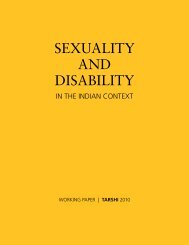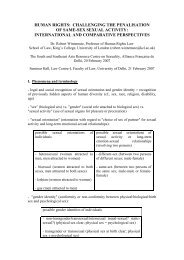FREE Download - TARSHI
FREE Download - TARSHI
FREE Download - TARSHI
Create successful ePaper yourself
Turn your PDF publications into a flip-book with our unique Google optimized e-Paper software.
anatomy and physiology. This view holds that the differences between men's and women's sexuality is<br />
biologically predetermined. Hierarchical power dynamics within sexual exchanges between men and<br />
women are viewed as a representation of the 'natural order of things'. The essentialist perspective has<br />
received a boost in recent years from the growth in evolutionary behavioural genetics and sociobiology<br />
that argue that sexual behaviour is genetically determined and represents the outcome of natural<br />
selection through which men have evolved as multi-partner, sexual aggressors, and, women as<br />
monogamous and sexually submissive (Price, 2000). Ironically, though borne out of a different<br />
perspective, some forms of radical feminist thinking themselves appeal to a form of essentialism.<br />
In addressing power dynamics between men and women, such radical feminist thought associates<br />
men's sexuality with violence, lust, objectification and preoccupation with orgasm, and women's<br />
sexuality with nurturance, reciprocity, intimacy and an emphasis on non-genital pleasure (Sawicki 1991).<br />
Unlike the commitment to biological essentialism evident in many studies, an awareness of Freudian<br />
thought, despite its widespread influence on sexuality theory, is much less overtly obvious in the<br />
research reviewed. Freudian psychoanalytic thought conceptualises sexuality as representing the truth<br />
of people's essential selves. Sexuality is considered a basic drive that is regulated and controlled by<br />
social organisation and repressed for the social good. It considers women to be sexually more<br />
repressed than men. From Freud's theory of identity and sexuality stemmed a belief in the masculine as<br />
active and in pursuit, and the feminine as passive and pursued. The view that sexuality is repressed is<br />
exemplified by psychoanalytic approaches but was propagated also through views of Victorian morality<br />
and puritanism.<br />
These views of sexuality though starting from very different premises, offer understandings that<br />
are ahistorical and non-context specific. They fail to take note of sexual difference and diversity<br />
across culture, class, and age, for example, or to give a convincing account of the relationship between<br />
culture and biology. This failure to address specificity and context is likewise apparent in many<br />
studies reviewed here.<br />
In contrast to these views, and especially to psychoanalytic thought, Foucault advanced the proposition<br />
that sexuality was not only widely discussed but was an arena of multiple discourses which themselves<br />
produce the object - sexuality - which they purport to study or comment upon. Thus in Foucauldian<br />
thought, the sexual subject is both the object and the effect of discourse. Whilst none of these studies<br />
takes a Foucauldian approach, some of them illustrate that sexuality is a subject of multiple discourses<br />
across India that serve to produce particular notions of the 'sexual subject' (e.g. male adolescent<br />
views on desire and rape, women's perspectives on weakness and sexual ill-health). Foucault's work<br />
has been widely taken up by feminists who, whilst critiquing it for its lack of attention to technologies<br />
of gender, have moved on to analyse the everyday relations of power and how they serve to<br />
produce normative gendered notions of sexuality and sexual behaviour/identity. Foucault's failure<br />
to address the intersubjective and the psychological has been addressed by writers such as Judith<br />
Butler who weaves together Foucauldian and psychoanalytic thought to offer a different take on feminist<br />
readings of sexuality.<br />
From an Indian or postcolonial perspective, Kalpana Ram (1998) argues that Foucault's failure<br />
to interrogate the colonial construction of European modernity has been particularly noticeable,<br />
assuming as it does a unilinear progressive replacement of the old with the new. The tendency to view<br />
traditional sexual norms as overtaken by the irrevocable forward march of the modern is present in<br />
many of the studies reviewed. An Indian reworking of this unilinear concept of changes in sexual mores<br />
could suggest instead that sexuality is subject to a double articulation whereby each - the past and the<br />
present - is coloured and re-constituted by the other (Ram,1998). This move is of particular importance<br />
to feminist thinking as it is often through appeals to apparently solidified traditions from the past that<br />
5










